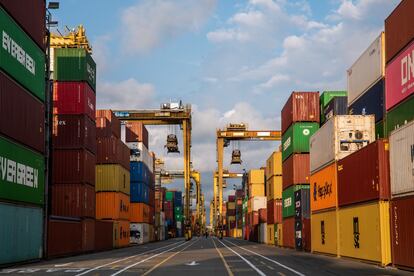IMF upgrades global growth forecasts, believes inflation has peaked
Fund’s chief analyst says there is a ‘turning point’ for the better in the world economy, but remains cautious


The global economy is showing small signs of improvement. The International Monetary Fund (IMF) has updated its forecasts and although the headline of its report is still scary (Inflation Peaking amid Low Growth), there is also room for some good news.
The central banks’ interest rate hikes are beginning to have an effect: inflation has peaked and is starting to ease. And for the first time in more than a year, the IMF has dared to raise its growth forecast for the world economy, albeit by only two tenths of a percentage point, to 2.9%. The Chief Economist and Director of the Research Department, Pierre-Olivier Gourinchas, has gone so far as to speak of a “turning point.”
After three years of continuous shocks (the pandemic, rising energy prices and the war in Ukraine, among others), it is still too early to declare victory. In fact, the IMF stresses that the growth forecast for 2023 is weaker than the 3.4% it is estimating for last year and that downside risks predominate. But behind this cautious message, the Fund’s economists also emphasize that things have improved since October, when they published their previous outlook.
“Adverse risks have moderated since the October 2022 World Economic Outlook. On the upside, a stronger boost from pent-up demand in numerous economies or a faster fall in inflation are plausible,” reads the latest update.
“The fight against inflation is starting to pay off, but central banks must continue their efforts,” said Gourinchas, adding that the global economy is poised to slow this year before rebounding next year. “Growth will remain weak by historical standards, as the fight against inflation and Russia’s war in Ukraine weigh on activity. Despite these headwinds, the outlook is less gloomy than in our October forecast, and could represent a turning point, with growth bottoming out and inflation declining.”
The soft landing hypothesis, i.e. that central banks will be able to control inflation without triggering a recession, is gaining ground. The IMF has raised its growth forecast for the United States by 0.4 percentage points to 1.4% and, above all, is no longer considering a central scenario of a fall in gross domestic product in Germany and Italy, as it did in October.
The German forecast has improved by 0.4 points to 0.1% while the Italian outlook has been upgraded by 0.8 points to 0.6%. Although the economic slowdown seems inevitable, the specter of stagflation in the euro zone is fading thanks to greater resilience to the energy crisis, a mild winter and a determined fiscal stimulus.
The sick man in Europe is now the United Kingdom, which has suffered a downgrade of 0.9 points and for which the agency headed by Kristalina Georgieva now expects GDP to fall by 0.6%. Recession is looming for Rishi Sunak’s government.
The improvements also extend to most of the emerging economies, with China leading the way with growth forecast at 5.2%, nine tenths of a percentage point higher than the IMF anticipated in October. “China’s sudden re-opening paves the way for a rapid rebound in activity,” said Gourinchas. India will grow an even more impressive 6.2%. The outlook is also better for Latin America’s two major economies: two tenths of a point for Brazil, to 1.2%, and half a point for Mexico, to 1.7%. “Global financial conditions have improved as inflation pressures started to abate. This, and a weakening of the US dollar from its November high, provided some modest relief to emerging and developing countries,” said Gourinchas.
Among the downside risks, the IMF highlighted a worsening of the Covid pandemic in China, a possible escalation of the war in Ukraine, negative inflation surprises forcing central banks to tighten monetary policy, a tightening of financial conditions, possible bouts of market instability and geopolitical fragmentation.
The World Economic Outlook update does not include country-by-country inflation forecasts, but the Fund estimates that price escalation will be lower in 2023 than in 2022 in 84% of economies. Global inflation will fall from an annual average of 8.8% last year to 6.6% this year and 4.3% next year, according to its forecasts.
Persistent inflation is, however, one of the risks that the Fund is insisting on. Where price pressures remain too high, it invites central banks to raise real interest rates above the neutral rate (which neither stimulates nor drags down the economy) and keep them there until underlying inflation is on a clear downward path. “Easing too early risks undoing all the gains achieved so far,” said Gourinchas.
The IMF economist concludes with an optimistic but cautious message: “This time around, the global economic outlook hasn’t worsened. That’s good news, but not enough. The road back to a full recovery, with sustainable growth, stable prices, and progress for all, is only starting.”
Sign up for our weekly newsletter to get more English-language news coverage from EL PAÍS USA Edition
Tu suscripción se está usando en otro dispositivo
¿Quieres añadir otro usuario a tu suscripción?
Si continúas leyendo en este dispositivo, no se podrá leer en el otro.
FlechaTu suscripción se está usando en otro dispositivo y solo puedes acceder a EL PAÍS desde un dispositivo a la vez.
Si quieres compartir tu cuenta, cambia tu suscripción a la modalidad Premium, así podrás añadir otro usuario. Cada uno accederá con su propia cuenta de email, lo que os permitirá personalizar vuestra experiencia en EL PAÍS.
¿Tienes una suscripción de empresa? Accede aquí para contratar más cuentas.
En el caso de no saber quién está usando tu cuenta, te recomendamos cambiar tu contraseña aquí.
Si decides continuar compartiendo tu cuenta, este mensaje se mostrará en tu dispositivo y en el de la otra persona que está usando tu cuenta de forma indefinida, afectando a tu experiencia de lectura. Puedes consultar aquí los términos y condiciones de la suscripción digital.








































